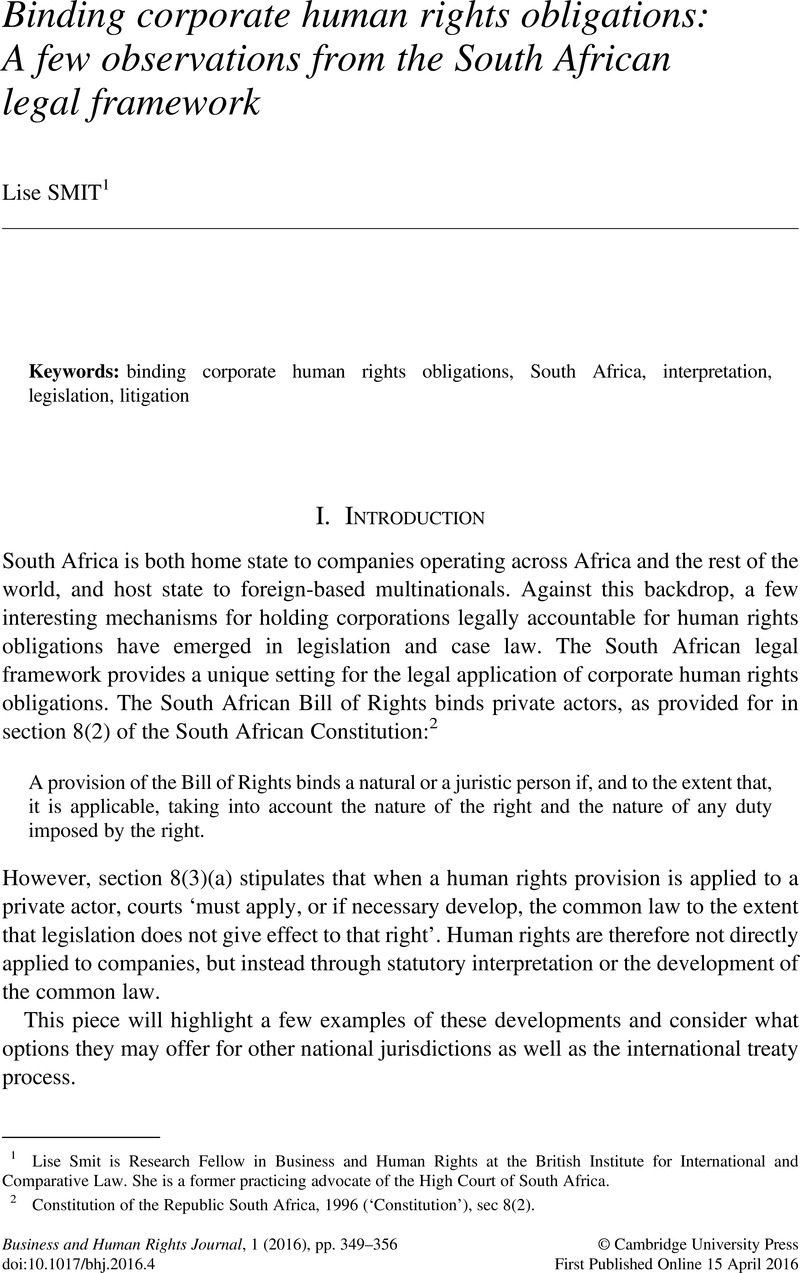Published online by Cambridge University Press: 15 April 2016

Lise Smit is Research Fellow in Business and Human Rights at the British Institute for International and Comparative Law. She is a former practicing advocate of the High Court of South Africa.
2 Constitution of the Republic South Africa, 1996 (‘Constitution’), sec 8(2).
3 The author wishes to thank Freya Dinshaw for her valuable research assistance and insights, particularly on corporate law aspects.
4 2006 (5) SA 333 (W).
5 Act 36 of 1998.
6 Stilfontein, note 4, para 16.4.
7 Institute of Directors in Southern Africa, King Report on Corporate Governance (2002) also known as King II. The Court in this finding quotes from para 18.7 of the report at para 16.9 of the judgment. The King Committee has since developed the King III Report and King Code, Institute of Directors in Southern Africa, King Code of Governance Principles and the King Report on Governance (King III) (2010).
8 Ibid, para 16.9.
9 Ibid.
10 See Smit, Lise, ‘Human rights litigation against companies in South African courts: A response to Mankayi v Anglogold Ashanti 2011 (3) SA 237 (CC)’ (2011) 27 South African Journal on Human Rights 354 Google Scholar.
11 Companies Act 71 of 2008, sec 72(4), read with Regulation 43 of the Companies Regulations, 2011, GN R351, GG 34239 of 26 April 2011. These requirements apply to all state owned and publicly listed companies as well as others (Regulation 43(1)).
12 Regulation 43(5)(a) of the Companies Regulations, ibid.
13 A few other cases have also referred to the King Report and King Code, mostly in the context of corporate governance relating to internal corporate structural issues as opposed to social responsibility or sustainability. See, for example, South African Broadcasting Corporation Ltd v Mpofu [2009] 4 All SA 169 (GSJ); Cape Empowerment Trust Ltd v Druker 2013 JDR 1360 (WCC), para 80.
14 Human Rights Council, ‘Guiding Principles on Business and Human Rights: Implementing the United Nations “Protect, Respect and Remedy” Framework’, A/HRC/17/31 (21 March 2011), HR/PUB/11/04.
15 Section 8(2) and 8(3) of the Constitution, discussed above, provide the relevant constitutional framework for the application of human rights to companies, note 3.
16 2013 (3) SA 382 (WCC).
17 Rehana Cassim, ‘Hiding Behind the Veil’, De Rebus October 2013, 34, 35.
18 Ibid, 35.
19 Gore, note 16, paras 19–29.
20 Ibid, para 34.
21 Ibid.
22 Ibid, para 35.
23 Cape Argus, ‘Brothers face fraud charges of R600m’, IOL News (31 July 2014), http://www.iol.co.za/news/brothers-face-fraud-charges-of-r600m-1.1728688#.Vl8Z7-N_sz4 (accessed 4 February 2016).
24 Gore, note 16, para 35.
25 Constitution, note 3, sec 8(2).
26 Ibid, sec 8(3).
27 Dennis Davis and Karl Klare write: ‘We believe that the Constitution’s new conception of the relationship between a constitution and common law will someday be heralded as one of the great legal innovations to emerge from South Africa’s transition to democracy’. Davis, Dennis and Klare, Karl, ‘Transformative Constitutionalism and the Common and Customary Law’ (2010) 26 South African Journal on Human Rights 403 Google Scholar, 410.
28 2015 (5) SA 221 (WCC).
29 Act 32 of 1944.
30 Stellenbosch Legal Aid Clinic, note 28, para 2.
31 Ibid, para 3.
32 Ibid, para 5.
33 Ibid, para 6.
34 Ibid, para 71.
35 Ibid, para 74.
36 UN Human Rights Council Resolution 26/22, UN Doc A/HRC/RES/26/22 (15 July 2014), referred to at para 72 of the judgment.
37 Convention concerning the Protection of Wages, 1949, No.95 (adopted 1 July 1949, entered into force 24 September 1952).
38 Stellenbosch Legal Aid Clinic, note 28, para 67.
39 Ibid, para 15.
40 Ibid, para 32 referring to Companies Act, sec 5(1), 5(2) and 7.
41 Constitution, note 3, sec 39(2).
42 Ibid, sec 8(2).
43 See Brits, Reghard, ‘Protection for homes during mortgage enforcement: human-rights approaches in South African and English law’ (2015) 132 South African Law Journal 566 Google Scholar.
44 For example, Mankayi v Anglogold Ashanti 2011 (3) SA 237 (CC).
45 Constitution, note 3, sec 39(1)(b).
46 Gore, note 16, para 28.
47 Faiza Ben Hashem v Shayif and Another [2008] EWHC 2380 (Fam), paras 159–64, original emphasis, cited in Gore ibid, para 22.
48 Gore, ibid, para 27.
49 Ibid, para 34.
50 Chandler v Cape PLC [2012] EWCA Civ 525.
51 Choc v Hudbay Inc, 2013 ONSC 1414.
52 Skinner, Gwynne, ‘Parent Company Liability: Ensuring Justice for Human Rights Violations’, The International Corporate Accountability Roundtable (2015), 20, http://icar.ngo/wp-content/uploads/2015/06/ICAR-Parent-Company-Accountability-Project-Report.pdf Google Scholar (accessed 12 March 2016).
53 See a case summary and discussion in Skinner, ibid, 19–20.
54 See a case summary and discussion in Skinner, ibid, 20–1.
55 Gore, note 16, para 35.
56 Ibid, para 29, quoting from Ebrahim v Airports Cold Storage (Pty) Ltd 2008 (6) SA 585 (SCA), para 15.
57 See Smit, note 10, 369.
58 Kloosterman, John, Springer, Sari, Sutton, Trent, and Wijekoon, Lavanga, ‘In Canada, Foreign Workers Seek to Use International Norms as the Standard of Care in Negligence Claims Against Multinationals Operating Overseas’ JD Supra Business Advisor (16 September 2015)Google Scholar http://www.jdsupra.com/legalnews/in-canada-foreign-workers-seek-to-use-77833 (accessed 4 February 2016).